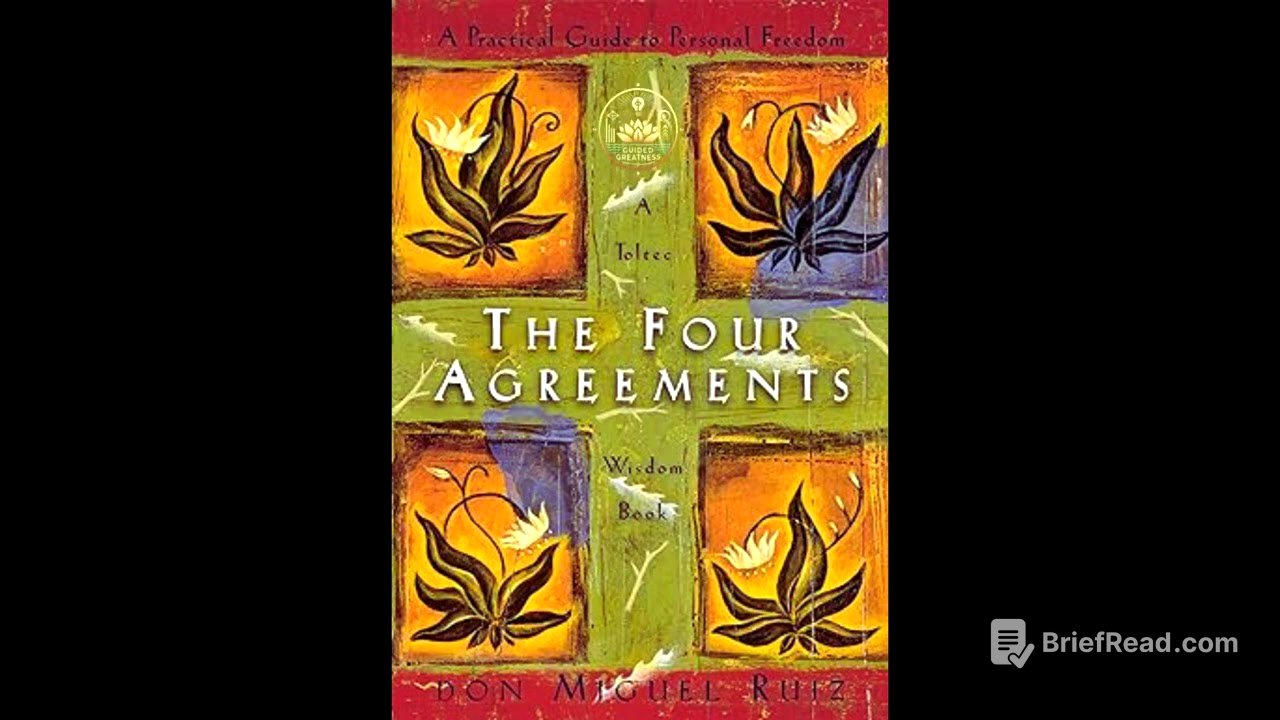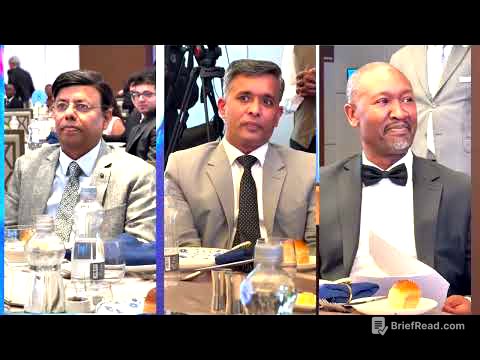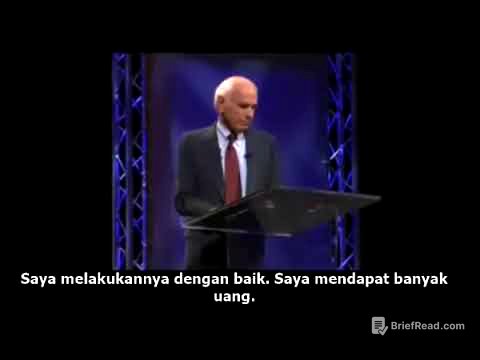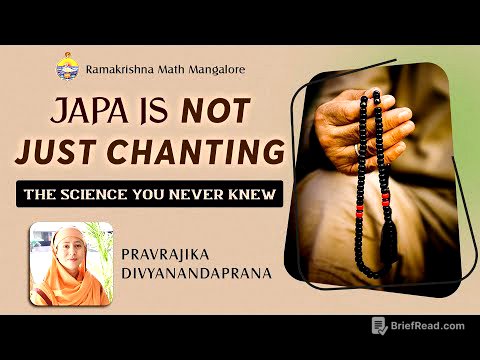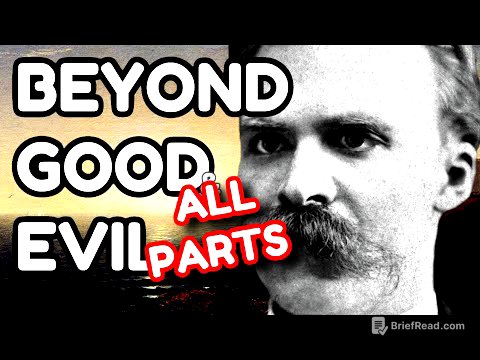TLDR;
This video summarizes "The Four Agreements" by Don Miguel Ruiz, providing a roadmap to personal freedom and happiness through ancient Toltec wisdom. It introduces the concept of domestication, where societal beliefs and rules shape our perception, often leading to suffering. The video then details each of the Four Agreements: be impeccable with your word, don't take anything personally, don't make assumptions, and always do your best, explaining how they can transform your life by breaking free from fear-based agreements and embracing love and truth.
- Domestication and societal beliefs shape our perception, often leading to suffering.
- The Four Agreements offer a path to personal freedom and happiness.
- Breaking free from fear-based agreements and embracing love and truth is key.
- The Toltec path involves awareness, transformation, and mastery of intent.
Introduction [0:00]
The video introduces the Toltecs as scientists and artists who preserved spiritual knowledge. Don Miguel Ruiz, a Nagual from the Eagle Knight lineage, shares the Toltec teachings, which align with other sacred traditions but emphasize a practical way of life centered on happiness and love. The concept of the "Smoky Mirror" is introduced through a story of a human who realized that everything is made of light and that human perception is merely light perceiving light. The "Smoky Mirror" represents the fog of interpretation that prevents us from seeing our true selves, which are pure love and light.
Chapter 1 Domestication and the Dream of the Planet [6:30]
This chapter explains that humans are constantly dreaming, even when awake. The "dream of the planet" is the collective dream of society, encompassing its rules, beliefs, and laws. Domestication is the process by which we learn to dream the way society dreams, with parents, schools, and religion teaching us these rules. Attention is key to this process, as adults hook our attention and instill information through repetition. This leads to the development of a belief system, where we agree with and have faith in the information passed down, often surrendering to these beliefs even if we rebel against them. This domestication process is similar to training animals, using punishment and reward to shape behavior. The inner judge and victim perpetuate this cycle, leading to self-abuse and the acceptance of abuse from others. The chapter concludes by stating that to live a life of joy, one must break fear-based agreements and reclaim personal power.
Chapter 2 The First Agreement [31:07]
The First Agreement is to "be impeccable with your word." Your word is the power to create and manifest, a gift from God. It can create beauty and love or destruction and hell. Impeccability means using the word without sin, not against yourself or others. Sin is anything you do that goes against yourself, such as judging or blaming yourself. The word is like a seed planted in the fertile ground of the human mind, and it's important to cultivate the mind for seeds of love rather than fear. Misusing the word is black magic, while using it correctly is white magic. Gossip is the worst form of black magic, acting as a computer virus that infects minds and breaks down communication. Being impeccable with your word means using your energy in the direction of truth and love, which can cleanse emotional poison and provide immunity from negative spells.
Chapter 3 the second agreement [53:32]
The Second Agreement is "don't take anything personally." What others do is a projection of their own dream and agreements, not about you. Taking things personally is selfish and leads to feeling offended, defending beliefs, and creating conflicts. You are not responsible for the actions of others, only for yourself. By not taking things personally, you become immune to emotional poison and black magicians. This agreement helps break habits that trap you in hell and cause suffering. It allows you to travel through the world with an open heart, free from anger, jealousy, and sadness.
Chapter 4 the third agreement [1:08:00]
The Third Agreement is "don't make assumptions." Making assumptions leads to misunderstandings, taking things personally, and creating drama. It's better to ask questions and seek clarification than to assume. The "big mote" in the human mind causes misinterpretations and misunderstandings. Assumptions in relationships lead to fights and difficulties. To avoid making assumptions, ask questions and communicate clearly. This will transform relationships and eliminate emotional poison.
Chapter 5 the fourth agreement [1:20:05]
The Fourth Agreement is "always do your best." Your best will vary from moment to moment, depending on your health, mood, and energy levels. Do no more and no less than your best. If you try too hard, you deplete your energy; if you do less than your best, you subject yourself to frustration and regret. By always doing your best, you avoid self-judgment and break a big spell. Take action because you love it, not because you expect a reward. Doing your best is a ritual, a way to honor God and express self-love. It involves letting go of the past and living in the present moment.
Chapter 6 the Toltec path to Freedom [1:37:27]
This chapter explores the Toltec path to freedom, emphasizing that true freedom is the freedom to be ourselves. The judge, the victim, and the belief system prevent us from being free. The first step toward personal freedom is awareness. The Toltecs compare these to a parasite that invades the human mind, feeding on negative emotions. To break free, one can attack the parasite head by head (facing fears), stop feeding the parasite (controlling emotions), or undergo the initiation of the dead (symbolic death). The art of transformation involves changing fear-based agreements and programming the mind in a new way. The discipline of the warrior involves controlling emotions and refraining from repression. The initiation of the dead involves embracing the angel of death and surrendering to the present moment.
chapter 7 the new dream [2:09:40]
This chapter encourages the listener to forget everything they have learned and create a new dream, a new perception of reality. It encourages the listener to imagine a life free of conflict, judgment, and fear, a life where they love themselves and others unconditionally. This is the state of grace, the dream of heaven. Love has the ability to put you in that state of bliss. The world is beautiful, and life can be easy when love is your way of life. The chapter concludes with prayers for freedom and love, encouraging a communion with the creator and a sharing of love with all beings.
